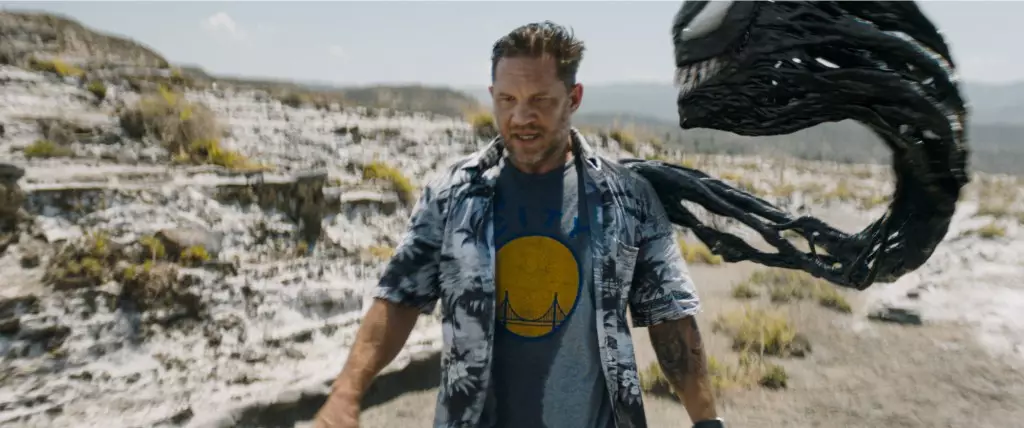In the latest chapter of the Marvel Universe, “Venom: The Last Dance,” we find ourselves in the whimsical yet violent world inhabited by the titular character, Eddie Brock. Led by Tom Hardy, the film boasts an impressive cast, predominantly featuring British actors portraying quintessentially American roles. This peculiar choice, while it might raise eyebrows, ultimately brings a layered charm to the film. Among the talent are Chiwetel Ejiofor, Juno Temple, and Rhys Ifans, all of whom infuse the narrative with compelling performances. However, the film’s premise of symbiotic creatures blends well with the Dunkirk-like spirit of camaraderie amidst chaos, as seen through the lens of Kelly Marcel’s directorial approach in her debut.
Despite the stellar performances, one can’t help but draw parallels between “Venom: The Last Dance” and previous superhero missteps, notably Sam Raimi’s “Spider-Man 3.” Just as that film struggled to align its narrative direction, “The Last Dance” too grapples with its identity. Although there’s an alluring premise and humor, the execution frequently hangs on a precipice of disarray, seeking to justify its narrative path. Within the sprawling canvas of the superhero genre, one wonders if merely evoking past successes is sufficient to engage audiences in 2023.
The film kicks off with an unembellished introduction to its dark universe, showcasing a grim, Stygian prison planet where we meet Knull, played by Andy Serkis. His ambitious plot to become “God of the Void” aims to cultivate havoc across the Marvel Cinematic Universe (MCU). Knull’s unabashed bravado—shouting proclamations of power—echoes the grandiose villains of yesteryears, yet simultaneously highlights a sense of redundant cliche. This setup veers perilously close to feeling formulaic, invoking fatigue in viewers accustomed to the often-repetitive narrative arcs in the genre.
As the action unfolds, we reconnect with Eddie Brock. However, rather than launching into an expansive overview of prior events, the film instead expects audiences to operate with implicit knowledge of Brock’s history, including his ongoing relationship with the alien symbiote, Venom. While some may appreciate the brisk pacing, others could find this decision alienating, particularly those who haven’t maintained unwavering allegiance to the franchise. The onset of Eddie’s challenges, compounded by his intoxicated misadventures in Mexico, serves as a familiar motif—a comedic distraction, albeit one that fails to establish the stakes clearly.
At its core, “Venom: The Last Dance” revolves around themes of identity and clarification amidst chaos. Led by Brock’s quest to locate a mysterious codex, the film haltingly constructs the classic narrative of a chase—the fight against imminent doom is made all the more surreal by the surreal antics of Venom. The intertwining storylines culminate in a messiness that calls into question the overall coherence of events. The introduction of new characters such as Dr. Payne, who’s haunted by her past, and General Rex Strickland creates an opportunity for rich storytelling, yet feels underexplored as the film races forward.
The constant shifting between different arcs lacking thorough exploration can frustrate viewers who yearn for character depth. This perpetual motion sometimes obscures opportunities for emotional resonance, as characters express motivations without fully justifying their actions on screen. The film endeavors to include the familiar tropes of the genre, but in doing so, it risks overlooking the moments that might elevate it from being just another superhero flick.
Visually, the film presents itself as a tantalizing yet chaotic spectacle. The combination of symbiotic essence and frenetic action sequences can occasionally lead to confusion rather than visual delight. Marcel’s direction often walks the line between comprehensibility and overwhelming spectacle—a struggle that may alienate viewers seeking cohesive storytelling. However, notable moments, such as Venom’s impromptu disco dance to ABBA in Las Vegas, elicit mixed reactions. This dissonance between a serious narrative and comedic undertones raises the inevitable question: can audiences genuinely take a threat from a symbiotic invasion seriously after such whimsical interludes?
While “Venom: The Last Dance” undoubtedly includes elements of charm and curiosity, it ultimately pales compared to its aspirations. It seeks to forge its own path within the MCU while appearing to rely heavily on antecedents. Whether this installment succeeds in grasping the audience’s interest will depend on individual expectations and openness to the chaotic blend of its narrative themes. Ultimately, the film may be best appreciated as a humorous diversion rather than a compelling cornerstone in the ever-expanding superhero pantheon.
